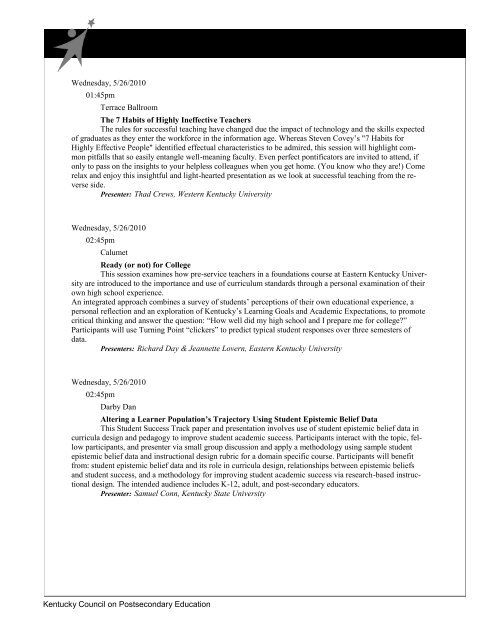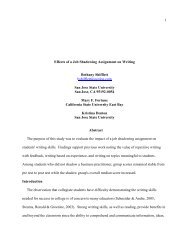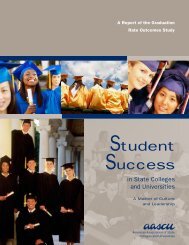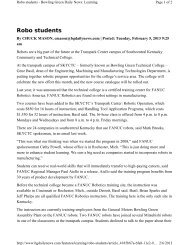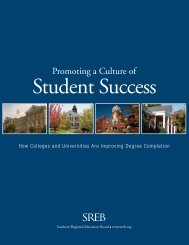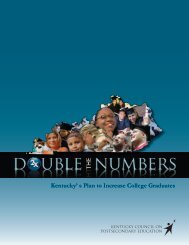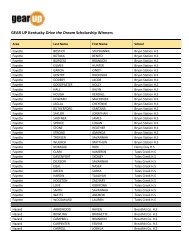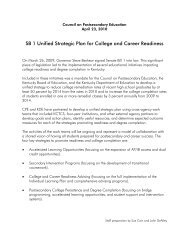Wednesday, 5/26/201001:45pmLanes EndShred Those Worksheets! Make Learning Come Alive!The days of assigning worksheets are over! C<str<strong>on</strong>g>and</str<strong>on</strong>g>idates in K-12 educati<strong>on</strong> programs need to learn howto bring <str<strong>on</strong>g>the</str<strong>on</strong>g> WOW into <str<strong>on</strong>g>the</str<strong>on</strong>g>ir classrooms. This sessi<strong>on</strong> will include creative, innovative strategies involving technology,classroom management, simulati<strong>on</strong>s, <str<strong>on</strong>g>and</str<strong>on</strong>g> investigati<strong>on</strong>s that can be used in several c<strong>on</strong>tent areas. Fun<str<strong>on</strong>g>and</str<strong>on</strong>g> meaningful applicati<strong>on</strong>s for inquiry-based learning will be presented in an interdisciplinary c<strong>on</strong>structivistformat. Also, creative formative <str<strong>on</strong>g>and</str<strong>on</strong>g> summative assessments that will lead to improved student achievementwill be modeled.Presenters: Peggy McGuire, C<strong>on</strong>nie Hodge, & Peggy Petrilli, Eastern Kentucky University -CorbinWednesday, 5/26/201001:45pmSal<strong>on</strong> A/BInquire Within: Living <strong>on</strong> <str<strong>on</strong>g>the</str<strong>on</strong>g> Right Side of <str<strong>on</strong>g>the</str<strong>on</strong>g> BrainIt has always been important for students to be technically prepared <str<strong>on</strong>g>and</str<strong>on</strong>g> professi<strong>on</strong>ally competent.However, coming into <str<strong>on</strong>g>the</str<strong>on</strong>g> 21st century, it is even more important for <str<strong>on</strong>g>the</str<strong>on</strong>g>m to be creatively prepared, to be ableto go bey<strong>on</strong>d <str<strong>on</strong>g>the</str<strong>on</strong>g> ideas of <str<strong>on</strong>g>the</str<strong>on</strong>g> present, to deal with <str<strong>on</strong>g>the</str<strong>on</strong>g> complex set of issues facing this century.The future bel<strong>on</strong>gs to a very different kind of pers<strong>on</strong> with a very different kind of mind. We are now a part of anew world in which "right brain" qualities are essential. An effort must be made to introduce this type of thinkingto students.Presenter: Ryan Hargrove, University of KentuckyWednesday, 5/26/201001:45pmSal<strong>on</strong> G/HTeaching Students of Appalachian CultureThis presentati<strong>on</strong> will attempt to highlight pedagogical methods <str<strong>on</strong>g>and</str<strong>on</strong>g> interventi<strong>on</strong>s that work well withstudents of Appalachian culture. Though <str<strong>on</strong>g>the</str<strong>on</strong>g>re is great diversity in Appalachia, generalizati<strong>on</strong>s will be used thatbroadly address cultural values found by research to impact educati<strong>on</strong> for this populati<strong>on</strong>. Cultural traits to beaddressed include str<strong>on</strong>g family/community ties, loyalty to place, distrust of outsiders, social egalitarianism,collectivist but independent socializati<strong>on</strong>, patriarchal gender set, indirect communicati<strong>on</strong>, effects of bias, <str<strong>on</strong>g>and</str<strong>on</strong>g>preference for blue collar careers. Am<strong>on</strong>g suggesti<strong>on</strong>s for working with <str<strong>on</strong>g>the</str<strong>on</strong>g>se students are communicati<strong>on</strong> stylechanges, problem-based learning, <str<strong>on</strong>g>and</str<strong>on</strong>g> encouraging local educati<strong>on</strong>.Presenters: Kathryn Russ & Jennifer Williams<strong>on</strong>, Lindsey Wils<strong>on</strong> CollegeWednesday, 5/26/201001:45pmSax<strong>on</strong>yInvolving <str<strong>on</strong>g>the</str<strong>on</strong>g> Campus <str<strong>on</strong>g>and</str<strong>on</strong>g> <str<strong>on</strong>g>the</str<strong>on</strong>g> Community to Create Revelent Classroom LearningStudent learning is maximized when <str<strong>on</strong>g>the</str<strong>on</strong>g>y are fully engaged in <str<strong>on</strong>g>the</str<strong>on</strong>g> process of producing dem<strong>on</strong>strableoutcomes. Student motivati<strong>on</strong> for learning is increased when that outcome will be subjected to public scrutiny<str<strong>on</strong>g>and</str<strong>on</strong>g> is aggregated in to a larger product. Courses which incorporate student work into a peer <str<strong>on</strong>g>and</str<strong>on</strong>g> communityreviewed outcome create a relevant, engaging learning experience, as well as a multi-faceted assessment processinvovling student peers, campus-wide staff <str<strong>on</strong>g>and</str<strong>on</strong>g> faculty, <str<strong>on</strong>g>and</str<strong>on</strong>g> <str<strong>on</strong>g>the</str<strong>on</strong>g> off campus community.Presenter: David D<strong>on</strong>athan, St. Catharine CollegeKentucky <str<strong>on</strong>g>Council</str<strong>on</strong>g> <strong>on</strong> Postsec<strong>on</strong>dary Educati<strong>on</strong>
Wednesday, 5/26/201001:45pmTerrace BallroomThe 7 Habits of Highly Ineffective TeachersThe rules for successful teaching have changed due <str<strong>on</strong>g>the</str<strong>on</strong>g> impact of technology <str<strong>on</strong>g>and</str<strong>on</strong>g> <str<strong>on</strong>g>the</str<strong>on</strong>g> skills expectedof graduates as <str<strong>on</strong>g>the</str<strong>on</strong>g>y enter <str<strong>on</strong>g>the</str<strong>on</strong>g> workforce in <str<strong>on</strong>g>the</str<strong>on</strong>g> informati<strong>on</strong> age. Whereas Steven Covey‟s "7 Habits forHighly Effective People" identified effectual characteristics to be admired, this sessi<strong>on</strong> will highlight comm<strong>on</strong>pitfalls that so easily entangle well-meaning faculty. Even perfect p<strong>on</strong>tificators are invited to attend, if<strong>on</strong>ly to pass <strong>on</strong> <str<strong>on</strong>g>the</str<strong>on</strong>g> insights to your helpless colleagues when you get home. (You know who <str<strong>on</strong>g>the</str<strong>on</strong>g>y are!) Comerelax <str<strong>on</strong>g>and</str<strong>on</strong>g> enjoy this insightful <str<strong>on</strong>g>and</str<strong>on</strong>g> light-hearted presentati<strong>on</strong> as we look at successful teaching from <str<strong>on</strong>g>the</str<strong>on</strong>g> reverseside.Presenter: Thad Crews, Western Kentucky UniversityWednesday, 5/26/201002:45pmCalumetReady (or not) for CollegeThis sessi<strong>on</strong> examines how pre-service teachers in a foundati<strong>on</strong>s course at Eastern Kentucky Universityare introduced to <str<strong>on</strong>g>the</str<strong>on</strong>g> importance <str<strong>on</strong>g>and</str<strong>on</strong>g> use of curriculum st<str<strong>on</strong>g>and</str<strong>on</strong>g>ards through a pers<strong>on</strong>al examinati<strong>on</strong> of <str<strong>on</strong>g>the</str<strong>on</strong>g>irown high school experience.An integrated approach combines a survey of students‟ percepti<strong>on</strong>s of <str<strong>on</strong>g>the</str<strong>on</strong>g>ir own educati<strong>on</strong>al experience, apers<strong>on</strong>al reflecti<strong>on</strong> <str<strong>on</strong>g>and</str<strong>on</strong>g> an explorati<strong>on</strong> of Kentucky‟s Learning Goals <str<strong>on</strong>g>and</str<strong>on</strong>g> Academic Expectati<strong>on</strong>s, to promotecritical thinking <str<strong>on</strong>g>and</str<strong>on</strong>g> answer <str<strong>on</strong>g>the</str<strong>on</strong>g> questi<strong>on</strong>: “How well did my high school <str<strong>on</strong>g>and</str<strong>on</strong>g> I prepare me for college?”Participants will use Turning Point “clickers” to predict typical student resp<strong>on</strong>ses over three semesters ofdata.Presenters: Richard Day & Jeannette Lovern, Eastern Kentucky UniversityWednesday, 5/26/201002:45pmDarby DanAltering a Learner Populati<strong>on</strong>’s Trajectory Using Student Epistemic Belief DataThis Student Success Track paper <str<strong>on</strong>g>and</str<strong>on</strong>g> presentati<strong>on</strong> involves use of student epistemic belief data incurricula design <str<strong>on</strong>g>and</str<strong>on</strong>g> pedagogy to improve student academic success. Participants interact with <str<strong>on</strong>g>the</str<strong>on</strong>g> topic, fellowparticipants, <str<strong>on</strong>g>and</str<strong>on</strong>g> presenter via small group discussi<strong>on</strong> <str<strong>on</strong>g>and</str<strong>on</strong>g> apply a methodology using sample studentepistemic belief data <str<strong>on</strong>g>and</str<strong>on</strong>g> instructi<strong>on</strong>al design rubric for a domain specific course. Participants will benefitfrom: student epistemic belief data <str<strong>on</strong>g>and</str<strong>on</strong>g> its role in curricula design, relati<strong>on</strong>ships between epistemic beliefs<str<strong>on</strong>g>and</str<strong>on</strong>g> student success, <str<strong>on</strong>g>and</str<strong>on</strong>g> a methodology for improving student academic success via research-based instructi<strong>on</strong>aldesign. The intended audience includes K-12, adult, <str<strong>on</strong>g>and</str<strong>on</strong>g> post-sec<strong>on</strong>dary educators.Presenter: Samuel C<strong>on</strong>n, Kentucky State UniversityKentucky <str<strong>on</strong>g>Council</str<strong>on</strong>g> <strong>on</strong> Postsec<strong>on</strong>dary Educati<strong>on</strong>
- Page 1 and 2: 2010Kentucky Conference on
- Page 4 and 5: 2010 Kentucky Conferenceon
- Page 8 and 9: Wednesday, 5/26/201002:45pmDixianaI
- Page 10 and 11: Wednesday, 5/26/201003:45pmDixianaC
- Page 12 and 13: Wednesday, 5/26/201004:45pmDixianaF
- Page 14 and 15: Wednesday, 5/26/201005:30pmPoster S
- Page 16 and 17: Wednesday, 5/26/201005:30pmPoster S
- Page 18 and 19: Thursday, 5/27/201008:30amLanes End
- Page 20 and 21: Thursday, 5/27/201009:30amDixianaEx
- Page 22 and 23: Thursday, 5/27/201010:30amCalumetTe
- Page 24 and 25: Thursday, 5/27/201010:30amTerrace B
- Page 26: Thursday, 5/27/201011:30amTerrace B


